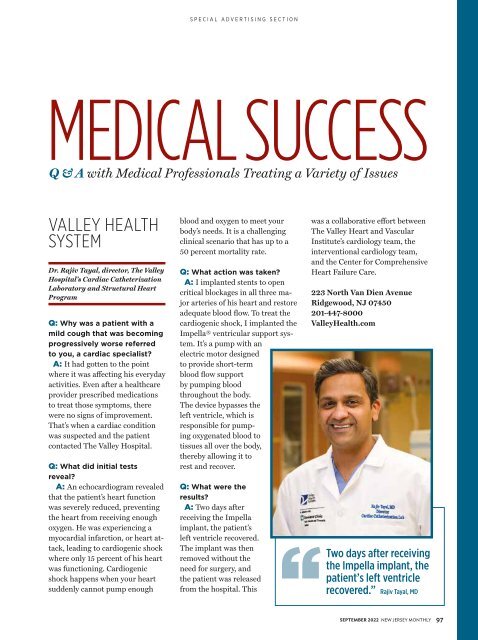2022_09_New_Jersey_Monthly
You also want an ePaper? Increase the reach of your titles
YUMPU automatically turns print PDFs into web optimized ePapers that Google loves.
SPECIAL ADVERTISING SECTION<br />
MEDICAL SUCCESS<br />
Q & A with Medical Professionals Treating a Variety of Issues<br />
VALLEY HEALTH<br />
SYSTEM<br />
Dr. Rajiv Tayal, director, The Valley<br />
Hospital’s Cardiac Catheterization<br />
Laboratory and Structural Heart<br />
Program<br />
Q: Why was a patient with a<br />
mild cough that was becoming<br />
progressively worse referred<br />
to you, a cardiac specialist?<br />
A: It had gotten to the point<br />
where it was affecting his everyday<br />
activities. Even after a healthcare<br />
provider prescribed medications<br />
to treat those symptoms, there<br />
were no signs of improvement.<br />
That’s when a cardiac condition<br />
was suspected and the patient<br />
contacted The Valley Hospital.<br />
Q: What did initial tests<br />
reveal?<br />
A: An echocardiogram revealed<br />
that the patient’s heart function<br />
was severely reduced, preventing<br />
the heart from receiving enough<br />
oxygen. He was experiencing a<br />
myocardial infarction, or heart attack,<br />
leading to cardiogenic shock<br />
where only 15 percent of his heart<br />
was functioning. Cardiogenic<br />
shock happens when your heart<br />
suddenly cannot pump enough<br />
blood and oxygen to meet your<br />
body’s needs. It is a challenging<br />
clinical scenario that has up to a<br />
50 percent mortality rate.<br />
Q: What action was taken?<br />
A: I implanted stents to open<br />
critical blockages in all three major<br />
arteries of his heart and restore<br />
adequate blood flow. To treat the<br />
cardiogenic shock, I implanted the<br />
Impella® ventricular support system.<br />
It’s a pump with an<br />
electric motor designed<br />
to provide short-term<br />
blood flow support<br />
by pumping blood<br />
throughout the body.<br />
The device bypasses the<br />
left ventricle, which is<br />
responsible for pumping<br />
oxygenated blood to<br />
tissues all over the body,<br />
thereby allowing it to<br />
rest and recover.<br />
Q: What were the<br />
results?<br />
A: Two days after<br />
receiving the Impella<br />
implant, the patient’s<br />
left ventricle recovered.<br />
The implant was then<br />
removed without the<br />
need for surgery, and<br />
the patient was released<br />
from the hospital. This<br />
was a collaborative effort between<br />
The Valley Heart and Vascular<br />
Institute’s cardiology team, the<br />
interventional cardiology team,<br />
and the Center for Comprehensive<br />
Heart Failure Care.<br />
223 North Van Dien Avenue<br />
Ridgewood, NJ 07450<br />
201-447-8000<br />
ValleyHealth.com<br />
Two days after receiving<br />
the Impella implant, the<br />
patient’s left ventricle<br />
recovered.” Rajiv Tayal, MD<br />
SEPTEMBER <strong>2022</strong> NEW JERSEY MONTHLY 97

















